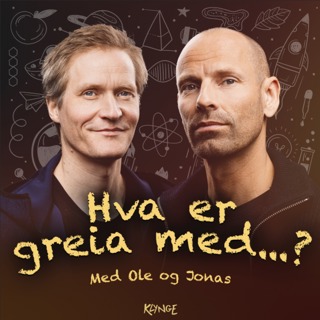
AMA | March 2022
Welcome to the March 2022 Ask Me Anything episode of Mindscape! These monthly excursions are funded by Patreon supporters (who are also the ones asking the questions). I take the large number of questions asked by Patreons, whittle them down to a more manageable size — based primarily on whether I have anything interesting to say about them, not whether the questions themselves are good — and sometimes group them together if they are about a similar topic. Enjoy!Support Mindscape on Patreon.See Privacy Policy at https://art19.com/privacy and California Privacy Notice at https://art19.com/privacy#do-not-sell-my-info.
17 Mar 20223h 18min

188 | Arik Kershenbaum on What Aliens Will Be Like
If extraterrestrial life is out there — not just microbial slime, but big, complex, macroscopic organisms — what will they be like? Movies have trained us to think that they won’t be that different at all; they’ll even drink and play music at the same cafes that humans frequent. A bit of imagination, however, makes us wonder whether they won’t be completely alien — we have zero data about what extraterrestrial biology could be like, so it makes sense to keep an open mind. Arik Kershenbaum argues for a judicious middle ground. He points to constraints from physics and chemistry, as well as the tendency of evolution to converge toward successful designs, as reasons to think that biologically complex aliens won’t be utterly different from us after all.Support Mindscape on Patreon.Arik Kershenbaum received his Ph.D. in Evolutionary Biology and Ecology from the University of Haifa. He is currently College Lecturer and Director of Studies at Girton College, University of Cambridge. He is the author of The Zoologist’s Guide to the Galaxy: What Animals on Earth Reveal About Aliens — and Ourselves.Web siteCambridge web pageGoogle Scholar publicationsAmazon author pageTwitterSee Privacy Policy at https://art19.com/privacy and California Privacy Notice at https://art19.com/privacy#do-not-sell-my-info.
14 Mar 20221h 21min

187 | Andrew Leigh on the Politics of Looming Disasters
We’re pretty well-calibrated when it comes to dealing with common, everyday-level setbacks. But our brains aren’t naturally equipped for dealing with unlikely but world-catastrophic disasters. Yet such threats are real, both natural and human-induced. We need to collectively get better at anticipating and preparing for them, at the level of political action. Andrew Leigh is an academic and author who now serves in the Parliament of Australia. We discuss how to move the conversation about existential risks from the ivory tower to implementation in real policies.Support Mindscape on Patreon.Andrew Leigh received his Ph.D. in Public Policy from the Kennedy School of Government at Harvard University. He is a member of the Australian House of Representatives representing Fenner. He was previously a professor of economics at Australian National University, and has served as Shadow Assistant Minister for Treasury and Charities. His recent book is What’s the Worst That Could Happen? Existential Risk and Extreme Politics.Web siteResearch web siteWikipediaTwitterSee Privacy Policy at https://art19.com/privacy and California Privacy Notice at https://art19.com/privacy#do-not-sell-my-info.
7 Mar 20221h 20min

186 | Sherry Turkle on How Technology Affects Our Humanity
Advances in technology have gradually been extending the human self beyond its biological extent, as we augment who we are with a variety of interconnected devices. There are obvious benefits to this — it lets us text our friends, listen to podcasts, and not get lost in strange cities. But as it changes how we interact with other people, it’s important to consider the possible downsides. Sherry Turkle is a psychologist and writer who specializes in the relationship between humans and their technology. She makes the case for not forgetting about empathy, conversation, and even the occasional imperfection in how we present ourselves to the world.Support Mindscape on Patreon.Sherry Turkle received her Ph.D. in sociology and personality psychology from Harvard University. She is currently Abby Rockefeller Mauzé Professor of the Social Studies of Science and Technology in the Program in Science, Technology, and Society at MIT, founding director of the MIT Initiative on Technology and Self, and a licensed clinical psychologist. Among her awards are a Guggenheim Fellowship, a Rockefeller Humanities Fellowship, the Harvard Centennial Medal, and she was named “Woman of the Year” by Ms. Magazine. Her new book is The Empathy Diaries: A Memoir.Web siteMIT web pageWikipediaAmazon author pageTwitterSee Privacy Policy at https://art19.com/privacy and California Privacy Notice at https://art19.com/privacy#do-not-sell-my-info.
28 Feb 20221h 11min

185 | Arvid Ågren on the Gene’s-Eye View of Evolution
One of the brilliant achievements of Darwin’s theory of natural selection was to help explain apparently “purposeful” or “designed” aspects of biology in a purely mechanistic theory of unguided evolution. Features are good if they help organisms survive. But should we put organisms at the center of our attention, or the genetic information that governs those features? Arvid Ågren helps us understand the attraction of the “selfish gene” view of evolution, as well as its shortcomings. This biological excursion has deep connections to philosophical issues of levels and emergence.Support Mindscape on Patreon.Arvid Ågren received his Ph.D. in Ecology and Evolutionary Biology from the University of Toronto. He is currently a Wenner-Gren Fellow at the Evolutionary Biology Centre at Uppsala University. Previously he worked at Cornell and Harvard. His recent book is The Gene’s-Eye View of Evolution.Web siteGoogle Scholar publicationsAmazon author pageTwitterSee Privacy Policy at https://art19.com/privacy and California Privacy Notice at https://art19.com/privacy#do-not-sell-my-info.
21 Feb 20221h 25min

184 | Gary Marcus on Artificial Intelligence and Common Sense
Artificial intelligence is everywhere around us. Deep-learning algorithms are used to classify images, suggest songs to us, and even to drive cars. But the quest to build truly “human” artificial intelligence is still coming up short. Gary Marcus argues that this is not an accident: the features that make neural networks so powerful also prevent them from developing a robust common-sense view of the world. He advocates combining these techniques with a more symbolic approach to constructing AI algorithms.Support Mindscape on Patreon.Gary Marcus received his Ph.D. in cognitive science from MIT. He is founder and CEO of Robust.AI, and was formerly a professor of psychology at NYU as well as founder of Geometric Intelligence. Among his books are Rebooting AI: Building Machines We Can Trust (with Ernest Davis).Web siteWikipediaTwitterAmazon.com author pageSee Privacy Policy at https://art19.com/privacy and California Privacy Notice at https://art19.com/privacy#do-not-sell-my-info.
14 Feb 20221h 24min

AMA | February 2022
Welcome to the February 2022 Ask Me Anything episode of Mindscape! These monthly excursions are funded by Patreon supporters (who are also the ones asking the questions). I take the large number of questions asked by Patreons, whittle them down to a more manageable size — based primarily on whether I have anything interesting to say about them, not whether the questions themselves are good — and sometimes group them together if they are about a similar topic. Enjoy!Support Mindscape on Patreon.See Privacy Policy at https://art19.com/privacy and California Privacy Notice at https://art19.com/privacy#do-not-sell-my-info.
10 Feb 20224h 15min

183 | Michael Dine on Supersymmetry, Anthropics, and the Future of Particle Physics
Modern particle physics is a victim of its own success. We have extremely good theories — so good that it’s hard to know exactly how to move beyond them, since they agree with all the experiments. Yet, there are strong indications from theoretical considerations and cosmological data that we need to do better. But the leading contenders, especially supersymmetry, haven’t yet shown up in our experiments, leading some to wonder whether anthropic selection is a better answer. Michael Dine gives us an expert’s survey of the current situation, with pointers to what might come next.Support Mindscape on Patreon.Michael Dine received his Ph.D. in physics from Yale University. He is Distinguished Professor of Physics at the Santa Cruz Institute for Particle Physics, University of California, Santa Cruz. Among his awards are fellowships from the Sloan Foundation, Guggenheim Foundation, American Physical Society, and American Academy of Arts and Sciences, as well as the Sakurai Prize for theoretical particle physics. His new book is This Way to the Universe: A Theoretical Physicist’s Journey to the Edge of Reality.Web pagePublications at iNspireWikipediaAmazon author pageSee Privacy Policy at https://art19.com/privacy and California Privacy Notice at https://art19.com/privacy#do-not-sell-my-info.
7 Feb 20221h 39min




















